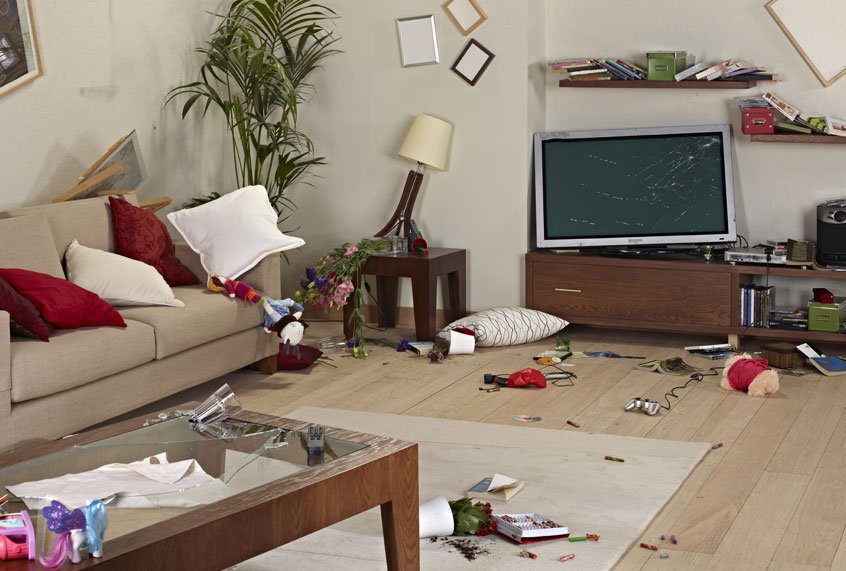Jolie Kerr and I sat down at a small table at a bar on the Lower East Side of Manhattan called Marshall Stack. I was very eager to get a cold beer in me, as it had been a rather disgustingly hot walk in the dead of summer when New York City is at its muggiest. I’d just been a guest on her wildly popular podcast, Ask A Clean Person, where she had me (writer of automotive-adjacent essays as well as creator of a podcast called Tempest) provide insights about car-related problems and messes.
I’d never met Jolie before, though I was highly familiar with her work: funny, smart, effective, profane She’s one of the reigning queens of clean, and she has a New York Times bestselling book called “My Boyfriend Barfed In My Handbag . . . And Other Things You Can’t Ask Martha,” a wildly popular podcast, and a slew of columns for publications like Esquire, Deadspin, New York Times and others. It was in that 15-minute walk from the studio to the bar during which she leaped seamlessly between the subjects of booze and depression and sex and media and protein-based stains that I decided I’d needed to profile her. She agreed to the idea.
When we sat down at the bar, I was eager to get straight to work and ask for some background on her, but it was hard to talk with the nearby person who was wailing and sobbing.
Now I lived in New York City for almost ten years, and I grew up right outside of it in New Jersey. There’s only one acceptable way of dealing with situations like this: you pretend nothing is happening.
But Jolie recognized the person, and before I knew it, she’d invited the crying lady to our table, and was coaxing the story out of her: she was two months late on rent, in debt to her parents, and worst of all, had just seriously bombed a very important job interview that she so desperately needed to nail.
Jolie pulled out her wallet and gave her two twenty-dollar bills. “This is for food for a few days,” she said. Then she went to the bar and gave the bartender some cash. She returned to the stranger at our table. “I pre-paid a tab for you so you can have a couple glasses of wine,” Jolie told her. “If you want, give me your address, and I’ll come over this weekend and help you clean your place,” she offered.
And then she said, “You happen to be sitting at a table with two professional writers, so let’s write you a follow-up letter to the person you just interviewed with.”
Fifteen minutes later, the woman was smiling, thanking us, and feeling good about her prospects, and we got on with our evening. I asked Jolie who the person was, why she had done what she had done.
As for who she was, Jolie said she wasn’t entirely sure, but that she knew she tended bar at a place Jolie had been to.
As for the more important question of why it seemed to her like a question that answered itself: it was a problem that needed to be solved.
Another day, another interview with Jolie. We’re at another a bar. This time a bar in a Cheesecake Factory bar in Glendale, CA. It’s barely noon. Jolie’s working on a chardonnay on the rocks. I’ve got a mai tai because I figure it’s an appropriate drink for such a ridiculous place.
Ridiculous but also perfectly fitting for like the Cheesecake Factory, she’s colorful. Not just metaphorically speaking, but physically. Her hair is blonde with streaks of pink, and her makeup is electric.
Her writing is more popular and higher-profile than ever, her following on social media never bigger. Her agent can’t wait for her next book proposal. It would seem things are going well for Jolie. And they are. But as she says it: “I’m a wreck.”
The person who makes a living teaching people how to clean anything, and organize everything, and then who comes to the rescue of all her friends and acquaintances takes another sip of her white wine, the glass sweating. “I’m a wreck,” she says again.
Jolie is at the vanguard of a new wave of experts and advice-givers who approach cleanliness with more than encyclopedic book-based knowledge. These professionals come to it with experience. And along with the guidance on how to make a bed, clean the sheets, deal with smelly upholstery, there’s a real and stark admission that life, if nothing else, is a complete and total mess.
***
Jolie Kerr wakes up on a Sunday morning. She navigates to her inbox. There’s an email from someone with the subject line “Cat Diarrhea on Silk Carpet.” There’s another one titled “Menstrual cup Qs.” In other words, it’s a typical Sunday — or really any day of the week — for Jolie.
These are the queries she gets. In fact, the messes get so, well, messy that it can occasionally be a problem for the publications she writes for. Tim Herrera, her editor at the New York Times, says, “I will admit, there are rare occasions when I have to tone it down a little,” adding, “but those occasions are never not hilarious and ridiculous.”
Like the column she wrote about dog messes. “She still gives me shit about cutting the phrase ‘released her anal glands’,” Tim tells me.
It may be a little too vivid for the Gray Lady, but for her own podcast, as well as sites like Deadspin and Esquire, she’s got a little more leeway. For the latter, she’s talked about how to get various stains out of clothes: deodorant, urine, vomit, lube. On her podcast, nothing is off off-limits (all kinds of sex) is a frequent topic, for instance. She even did an entire episode about how people wipe their butts.
“I’m the Clean Person who knows how to get mascara off my pillowcases because I’ve smeared mascara all over my pillowcases while facedown getting drilled by whoever I’m fucking at the moment and I’m gonna tell people that’s why I know how to get mascara off the pillowcases!” she wrote to me.
At first, this might seem to put her into some fringe or niche category, but one key to her success is that her appeal is universal. We all use the bathroom. We all eat messy food occasionally. We all get sweaty. And most people are having sex.
In fact, to Tim Herrera, it’s not that what she’s covering is so much on the fringe, but quite the opposite. And that, he says, is “what makes her unique. She takes a topic that a lot of people think of as one of the more mundane necessities of life, and she gets people actually excited about it.”
Meredith Haggerty, Jolie’s editor at Racked, says “I think cleaning is sometimes thought of as a niche topic which is . . . wild? Cleaning really is about the most universal topics: human mess, the consequences of owning or using things, the ravages of time.” In fact, she points out, “An actually-niche thing is people who never have to clean up after themselves.”
***
Messiness is a general term. For some people, it might refer to the papers strewn on a desk or the shadow of a stain where olive oil once soaked into a t-shirt. For others, it might mean blazing self-confidence, which is then followed by a weeks-long sheltering from friends and social media because life suddenly feels so brutal.
Jolie is definitely not the type to be walking around with olive oil stains on her shirt. Her childhood friends indicate she’s always been well-kept and orderly. And for a long time, her career followed a similarly neat and upward trajectory. Jolie pulls on her chardonnay and explains how she once enjoyed a lucrative salary as the content manager at a white-shoe law firm, the name of which she prefers to keep off the record.
But at 34 years old she had an epiphany: “It wasn’t Jolie doing the job. It was just some person who was qualified to do the work.” So she quit. Almost immediately thereafter, Ask A Clean Person column was published (first appearing in The Hairpin), born from an existential crisis of sorts.
But in fixing her own crisis, she wanted to fix other people, too. Only she’s not one for unsolicited advice. “I felt like the only way I can make sense of it in my mind is to make it an advice column where people are actually asking me for the help rather than me barging into someone’s life and being like, ‘You need help!’’”
This was an important revelation for Jolie. “By that point, I had realized that I mean well but people don’t always want your help. It’s not always a good quality to just offer to help people because it could come across as condescending, it can come across as judgmental, it can be just fuckin’ annoying. When I was starting Ask a Clean Person I didn’t want to be any of those things.”
This is why Jolie calls herself a Clean Person, but her friends call her “a fixer.” And she accepts that title, too, going so far as to tell me that she has “a need to be a fixer.” One way that she fixes things for her devotees is to answer their questions, to help them when they’ve spilled an entire takeout container of curry onto the passenger seat of their car. Or when they’ve slept over at their girlfriend’s parents’ house and woken up to their horror to find they’ve wet the bed. Or have looked around at the aftermath of a bachelor party at two o’clock in the morning to see that the AirB’n’B they’ve rented is covered in spray tan from the strippers that were hired.
These things seem funny, but they’re real messes, which are real problems, with real consequences. Then there’s Jolie with real solutions.
Perhaps that’s why her friends know her as Mrs. Wolfe — a reference to Harvey Keitel’s role in Pulp Fiction as Winston Wolfe, the ultimate fixer.
***
So who fixes the fixer? I wonder if Jolie has created her own occupational hazard. Her entire career and identity has become Jolie Kerr, professional fixer, and Clean Person. But, life, as we know is messy. Including her own. She doesn’t pretend otherwise.
On September 9, 2017, she wrote on Twitter, “Anxiety has left me sleep-deprived for months and all of a sudden, I can feel a 3 [year-old]-style fatigue meltdown coming on for no reason hoo boy.”
In August, 2018, she tweeted about her workout achievements, noting she managed it “despite the trifecta of a crushing hangover, crushing depression and crushing anxiety.” A week later, she posted a screenshot of the music she was listening to, saying “Extreme Anxiety requires Extreme Measures…”
But these are not exaggerations for humorous effect. And over the years, followers of Jolie will notice that she goes dark on Twitter. They’ll notice that she references a difficult breakup in 2018. They’ll notice that she occasionally references a marriage, as well as a divorce.
But it’s difficult, even for her closest friends, to get her to open up about these episodes. “She’ll isolate during her depressive phases or when things aren’t going well,” her friend, Phil Daniels explains.
Jolie says, “Of course I know I can call [friends]. But I don’t want to. When I’m down, I don’t want to. I don’t want to talk, because I have nothing good to say. I have nothing helpful to offer, I’m no fun.”
So she copes in silence with her divorce. She won’t go on record about her ex-husband, the painful reasons behind her divorce. She won’t discuss why the Cleancast once had a co-host, and now it doesn’t. For one thing, it’s not helpful. But there’s another reason.
“I’m happy to tell almost anything about me . . . [But] the broadest category of things I don’t talk about are things that involve other people where it’s not fully my story to tell,” she explains. “To talk about it would mean telling someone else’s story for them . . . I have to recognize that if I talk about something that involves somebody else who’s a private person, I’m dragging their lives into the public and that may not be fair.”
I ask her if this applies just as equally to friends as it does enemies.
“Yes,” she answers quickly and firmly. So even in her most depressed and angry moments, Jolie does something that’s difficult for her to do.
She stays silent.
***
Jolie is thriving at a time when there is an entire movement is pivoting to the polar opposite philosophy. And it’s happening right on your phone: social media influencers, and the people who try to appear as influencers.
You’ve seen them in your Facebook and Instagram feeds. Perhaps they are selling a product. Maybe they’re just doing it to show off. There’s a lot of selfies from odd, high angles, the image tortured by high contrast, blown-out lighting, and one of myriad filters.
Perfect skin. Spotless homes. Happiness. They have it figured out, it would appear. All you have to do is buy the product. Or sell the product. Or, really, be the product.
Life is messy. Life is stressful. Difficult. Depressing. We get old. We age. Our habitats become messy and we have to get off our asses and clean them. Constantly. This is reality.
“They’re selling a fantasy,” Jolie says. ”I’m not interested in doing that.”
















